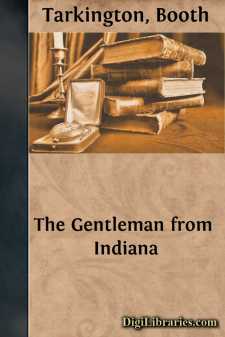Categories
- Antiques & Collectibles 13
- Architecture 36
- Art 48
- Bibles 22
- Biography & Autobiography 813
- Body, Mind & Spirit 142
- Business & Economics 28
- Children's Books 16
- Children's Fiction 13
- Computers 4
- Cooking 94
- Crafts & Hobbies 4
- Drama 346
- Education 46
- Family & Relationships 57
- Fiction 11829
- Games 19
- Gardening 17
- Health & Fitness 34
- History 1377
- House & Home 1
- Humor 147
- Juvenile Fiction 1873
- Juvenile Nonfiction 202
- Language Arts & Disciplines 88
- Law 16
- Literary Collections 686
- Literary Criticism 179
- Mathematics 13
- Medical 41
- Music 40
- Nature 179
- Non-Classifiable 1768
- Performing Arts 7
- Periodicals 1453
- Philosophy 64
- Photography 2
- Poetry 896
- Political Science 203
- Psychology 42
- Reference 154
- Religion 513
- Science 126
- Self-Help 84
- Social Science 81
- Sports & Recreation 34
- Study Aids 3
- Technology & Engineering 59
- Transportation 23
- Travel 463
- True Crime 29
The Flirt
by: Booth Tarkington
Description:
Excerpt
CHAPTER ONE
Valentine Corliss walked up Corliss Street the hottest afternoon of that hot August, a year ago, wearing a suit of white serge which attracted a little attention from those observers who were able to observe anything except the heat. The coat was shaped delicately; it outlined the wearer, and, fitting him as women's clothes fit women, suggested an effeminacy not an attribute of the tall Corliss. The effeminacy belonged all to the tailor, an artist plying far from Corliss Street, for the coat would have encountered a hundred of its fellows at Trouville or Ostende this very day. Corliss Street is the Avenue du Bois de Boulogne, the Park Lane, the Fifth Avenue, of Capitol City, that smoky illuminant of our great central levels, but although it esteems itself an established cosmopolitan thoroughfare, it is still provincial enough to be watchful; and even in its torrid languor took some note of the alien garment.
Mr. Corliss, treading for the first time in seventeen years the pavements of this namesake of his grandfather, mildly repaid its interest in himself. The street, once the most peaceful in the world, he thought, had changed. It was still long and straight, still shaded by trees so noble that they were betrothed, here and there, high over the wide white roadway, the shimmering tunnels thus contrived shot with gold and blue; but its pristine complete restfulness was departed: gasoline had arrived, and a pedestrian, even this August day of heat, must glance two ways before crossing.
Architectural transformations, as vital, staggered the returned native. In his boyhood that posthumously libelled sovereign lady, Anne, had terribly prevailed among the dwellings on this highway; now, however, there was little left of the jig-saw's hare-brained ministrations; but the growing pains of the adolescent city had wrought some madness here. There had been a revolution which was a riot; and, plainly incited by a new outbreak of the colonies, the Goth, the Tudor, and the Tuscan had harried the upper reaches to a turmoil attaining its climax in a howl or two from the Spanish Moor.
Yet it was a pleasant street in spite of its improvements; in spite, too, of a long, gray smoke-plume crossing the summer sky and dropping an occasional atomy of coal upon Mr. Corliss's white coat. The green continuous masses of tree-foliage, lawn, and shrubbery were splendidly asserted; there was a faint wholesome odour from the fine block pavement of the roadway, white, save where the snailish water-wagon laid its long strips of steaming brown. Locusts, serenaders of the heat, invisible among the branches, rasped their interminable cadences, competing bitterly with the monotonous chattering of lawn-mowers propelled by glistening black men over the level swards beneath. And though porch and terrace were left to vacant wicker chairs and swinging-seats, and to flowers and plants in jars and green boxes, and the people sat unseen—and, it might be guessed, unclad for exhibition, in the dimmer recesses of their houses—nevertheless, a summery girl under an alluring parasol now and then prettily trod the sidewalks, and did not altogether suppress an ample consciousness of the white pedestrian's stalwart grace; nor was his quick glance too distressingly modest to be aware of these faint but attractive perturbations....












